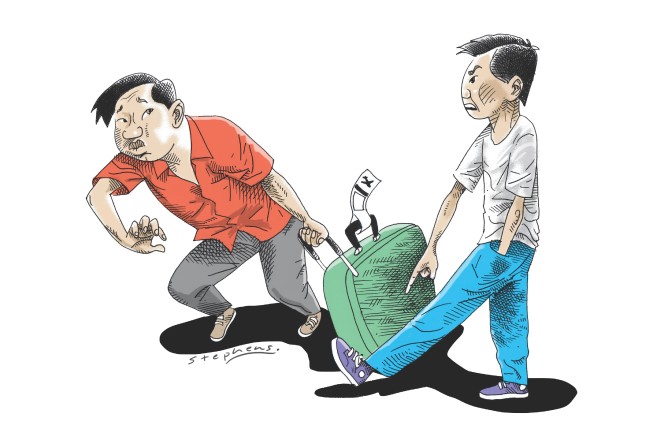In Hong Kong, fear of mainland influence hardens into prejudice
Keane Shum says whatever our stand on parallel traders or democracy, there's no denying that people in Hong Kong are uneasy over mainland influence. But turning it into an 'us vs them' issue doesn't help

We all have a story. A foot run over by a suitcase. A flight delayed by an unrestrained child. A quiet night at the cinema ruined by a tantrum. This is our war zone - remember, in this city, umbrellas are deadly weapons - and these our battle scars. We share our stories, we bond over them, the hurt they cause eased by the implication in every retelling that we are not like that. We are better.
My favourite story to tell is not my own. Last autumn, my girlfriend lined up for a minibus one evening in Admiralty. She was 14th in line for the 16 seats on the next bus when a young mainland Chinese man and his father rushed to cut in front of her. The father then counted heads and turned to my girlfriend.
"Lucky," he said to her, in accented Cantonese. "You're 16th!"
That is the message we keep hearing, from those who oppose the Umbrella Movement and the parallel trader protests, from our government, from Beijing: we are lucky just to be on the bus. We should be grateful, we are told, for enjoying the freedoms we already have, for being given more choice today than we had as a colony, for already being an exception to every other city in China.
Suitcase on your foot? Flight disrupted? Suck it up. If Snoop Dogg and Korean Air scions can get away with it, mainlanders should, too. They give us our water.
Only Snoop Dogg and Korean Air scions don't get away with it; they get arrested.
Of course, only a handful of our 40 million annual mainland visitors cause any of us any kind of trouble. The rest keep our economy and our livelihoods afloat without ever grating on our delicate sensibilities. Most Hongkongers get that. Just because I have a problem with the guy who steals my cab doesn't mean I share any common cause with the provocateurs bringing home-made pepper spray to Yuen Long.
But their frustration is borne of something we can all relate to, something none of us are above: a fear of change, the end of days gone by.
How we address that fear increasingly feels like the debate of our times, not only in Hong Kong and mainland China, but around the world, in France and Syria and Australia, in Russia and America and Nigeria. Days before the Charlie Hebdo massacre, the French writer Alain Finkielkraut commented, "People are homesick at home". He was talking about immigration and cultural integration in France, but he may as well have been describing the recent protests in Yuen Long, Sha Tin and Tuen Mun, and before that in Admiralty, Causeway Bay and Mong Kok.
Whatever our democratic leanings, we are all anxious about our inevitable "mainlandisation", already nostalgic about the infirm present. The fear is so strong because the change seems so overwhelming. It isn't just creeping up on us or trickling in; it seems to completely envelop the life we knew, from shopfronts in Yuen Long to property prices in Mei Foo and the taxi queue in Times Square.
These problems we face today, at home or abroad, seem to all be blamed on either too free an exchange of goods and ideas and people, or not enough. In my work with refugees, I argue for the latter, but it is a constant struggle trying to convince societies and governments to gamble on openness and the kindness of others. The Umbrella Movement, its supporters would say, does the same, asking our government to turn outwards, to pitch a larger tent, to not fear change.
Which way will our government turn? Which way will we?
I confront those questions every day at work, and wonder if China's vision of the future - on full display this month in the Great Hall of the People - will become not only Hong Kong's, but the world's.
Mainland Chinese streets and shopfronts aren't just replicating themselves in the New Territories; I see them sprouting up from Myanmar to Ghana, rows of strictly utilitarian concrete boxes stocked with sundries carted in from Dongguan and Yiwu . Mainlandisation is trending. Like its auntie, globalisation, it isn't something you can be for or against. It just is. And none of us can know for sure if that is better or worse for the world, or for Hong Kong.
But I can't help believing in a different vision. It means big things like the freedom to express yourself and equality before the law, and it means small things like waiting your turn and not shouting at a waiter. It also means not succumbing to the same sense of entitlement flaunted by the few among our mainland visitors gone rogue. If we keep telling our righteous war stories and thinking we are better, it will only show that we are not, that we are as narrow-minded as we accuse rude mainlanders of being.
So let them come. I have nothing to hide but this superiority complex I would like to get over.
If only we could all do that, on both sides of the Shenzhen River. If only we gave each other a little more time, a little more space. We should be so lucky.
Keane Shum is a lawyer in Hong Kong